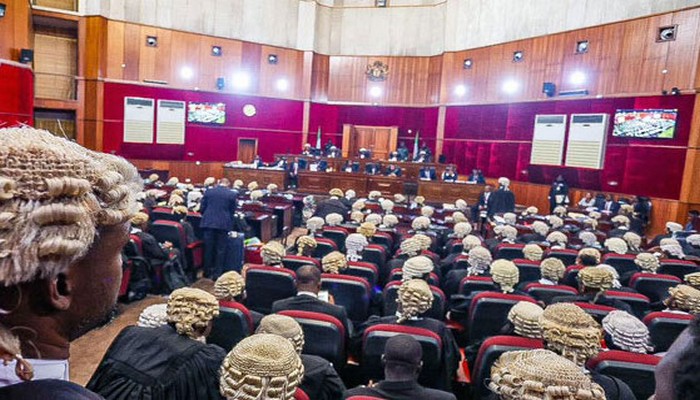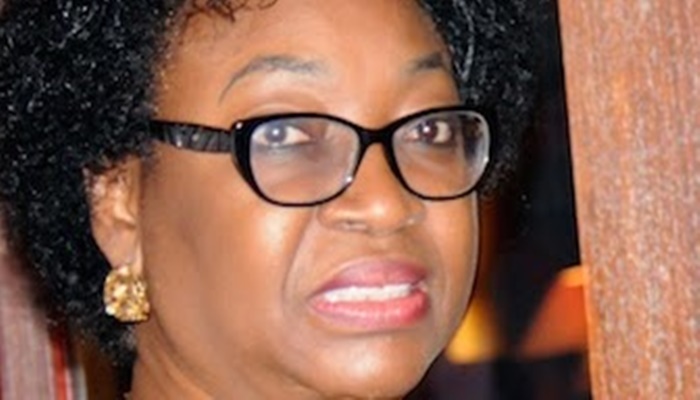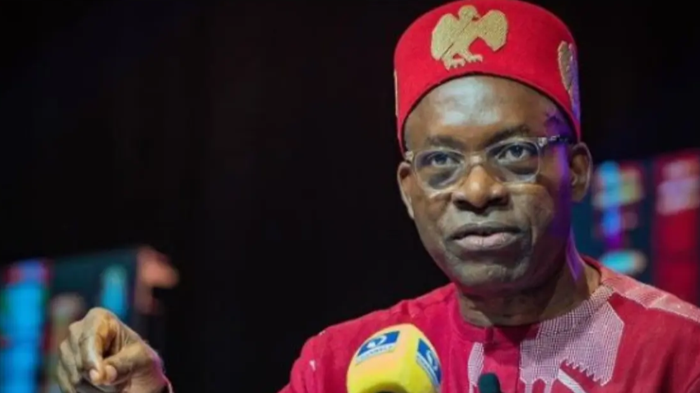
President Bola Tinubu and the All Progressives Congress (APC), Wednesday, closed the defence of their February 25 election victory with the evidence of the Senate Majority Leader, Opeyemi Bamidele, to deflate allegations and claims contained in the petitions file by Atiku Abubakar and the Peoples Democratic Party (PDP) as well as Mr. Peter Obi and the Labour Party (LP).
Before his testimony that drew the curtain on their defence to a close, their legal team tendered some bundles of documents, including the February 4, 2003 letter from the US Embassy in Nigeria, clearing Tinubu of any criminal indictment or conviction in the United States.
The Senator, who was a star witness, was led in his evidence-in- chief by the lead counsel to Tinubu, Chief Wole Olanipekun.
After adopting his statement on oath from the witness box in the LP-Obi petition, Bamidele told the Presidential Election Petition Court (PEPC) that in Kano State, the votes secured by Tinubu were not properly recorded and had a shortfall of 10,929 votes.
He equally presented the observers preliminary report from the Economic Community of West African State (ECOWAS), which stated that “vote counting and tallying processes were carried out in a transparent, simple and professional manner, in the presence of party agents, observers, and security agents in the daytime in some polling units and with lamps in others, where voting was delayed.”
He also claimed that the LP letter of membership list to INEC and its register of members for Anambra State, as at April 15, 2022, did not capture Obi’s name.
When it was the turn of INEC to cross examined him, counsel to the commission, Abubakar Mahmoud, said he had no question for him.
He was eventually cross examined by counsel to the APC, Lateef Fagbemi and Bamidele insisted that the LP membership register for Anambra did not contain the name of Peter Obi as at April 22, 2022.
He further testified that as an attorney who has practised in the United States since 1999, the forfeiture of funds traced to the bank account named ‘Bola Tinubu’ was not a criminal conviction or sentence as alleged by Obi’s legal team.
He tendered his identity card showing he is a member of the New York Bar.
It was equally his evidence that as a long-standing associate, he was aware that Tinubu is a Nigerian citizen by birth, apparently debunking claims about the president’s dual nationality.
Under cross-examination by the lead counsel to the petitioners, Obi’s lawyer, Livy Uzoukwu, he was asked if he saw the European Union (EU) Observer Mission final report on the Presidential Election, to which Bamidele noted he did.
Uzoukwu asked Bamidele to read paragraph 17 of the ECOWAS report which he did, citing where it noted incidents of violence and disruption occurred on election day leading to the death of a LP member. But Bamidele said he did not agree with that paragraph, adding the violence was caused by the Indigenous People of Biafra (IPOB).
Bamidele agreed that he did not have the licence to practice law in the state of Illinois, where the US Court Judgment on forfeiture came from. He also agreed with Uzoukwu that he is not an IT expert.
“I want to place it on record that American Bar Association is a voluntary Association?,” Uzoukwu noted, to which Bamidele agreed, saying, “it is a voluntary Association but you have to be a lawyer to be made a member.”
The witness, however, noted that the US court relied on the American law dealing on money laundering in Tinubu’s forfeiture but stressed that it was a civil matter. APC lawyer, Lateef Fagbemi told the PEPC that it was his belief that there was no need to call witness after Olanipekun and that APC had established its case and “we are not calling any witness.”
After his evidence, both Olanipekun and Fagbemi closed their defence in Obi’s case.
Meanwhile, the star witness failed to give a categorical answer when asked if Tinubu was the first to be declared president-elect without securing 25% of the total votes cast in the Federal Capital Territory (FCT).
The unanswered question was put to him by the counsel to the PDP and Atiku, Eyitayo Jegede.
The petitioners had claimed that the 1999 Constitution demands that for one to be declared winner in a Nigerian presidential election, such person must get 25 percent in 2/3 of the country’s 36 states and the FCT.
The former vice president himself did not get 25 percent votes in FCT but is seeking cancellation of the poll for a rerun. Eyitayo Jegede took the witness on regarding the FCT status in relation to the election and directed the registrar to give him (Bamidele) the Committee’s report on FCT, which had been tendered by Tinubu’s lawyer and identified by him.
According to that report, Abuja is called a symbol of unity, Jegede stated. Bamidele replied that the reference “symbol of unity” is subjective.
“How many states are in Nigeria?,” The PDP lawyer asked the witness, to which he said 36 states.
The witness was asked to tell the court what the capital of Abuja is but the witness maintained that Abuja is the Federal Capital Territory.
He was told by Jegede that the Committee’s report which he cited in open court to quash one of the grounds of Atiku’s petition (25 percent votes in FCT) recommended “that FCT should be specially provided for in the Constitution.”
Bamidele agreed with him. He was then asked if he was aware that former president Muhammadu Buhari and Musa Yar’Adua scored over 25 percent in FCT before they were declared winners in separate presidential elections.
The witness confirmed that of Buhari but said he did not recall the scores Yar’Adua got in the FCT.
“I put it to you that Tinubu will be the first person to be Nigeria President without winning 25 percent in FCT,” Jegede stated.
Bamidele replied that he was among lawmakers that worked on the Electoral Act 2022 and disagreeing with Jegede’s line of argument regarding FCT.
Jegede told him that of all the four major candidates in the presidential election (Tinubu, Atiku, Peter Obi and Rabiu Kwankwaso), Tinubu was the only one that did not win his home state, Lagos.
Raising his voice, Opeyemi said what a candidate needed to win an election is the majority of lawful votes cast across the federation or at least 25 percent of votes in 2/3 of the country.
He was stopped by a member of the PEPC panel who directed him to “Go straight to the (point and answer the) question. The question they are asking you is based on what INEC declared, not your opinion,” the panel told him.
Senator Bamidele did not answer the question while Jegede moved on to another question.
Subsequently, the five-man panel of the court led by Justice Haruna Tsammani gave the respondents 10 days each to file their written address.
“Petitioners have 7 days to file their written address, ” the court held.
Credit: The Sun






